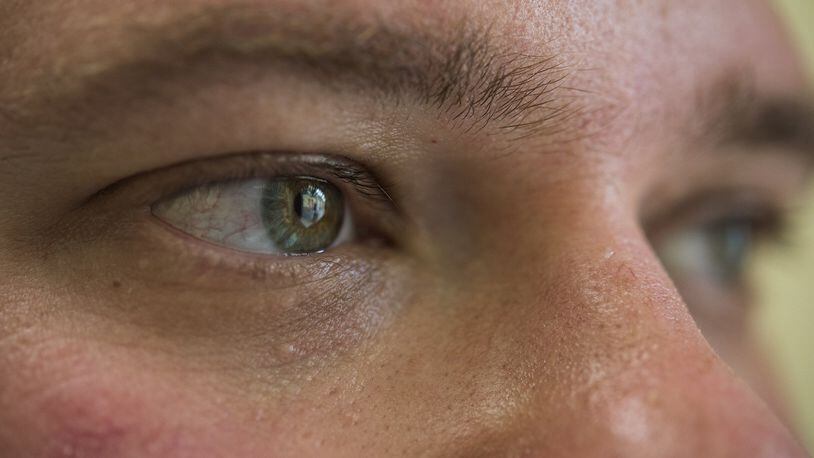Soon afterward, Brown recalled, a bright spot emerged in his vision and remained there for months. It faded eventually, he said, but he was left with permanent damage in his left eye, giving him heightened light sensitivity for life.
Twenty-six years later, families and schools nationwide are readying for another eclipse Monday afternoon. And Brown, now a history teacher at Suncoast High School, is telling students not to take the grown-ups' warnings lightly.
“We’ve been very diligent about letting our kids know every single day it’s not a joke,” Brown, now 36, said in an interview this week. “I made a poor mistake as a kid, and now I have to deal with it.”
Brown is a member of a growing chorus of adults who stared too long at an eclipse as children and are now recounting the long-term effects to deter children from permanent injuries this time.
RELATED: Solar Eclipse 2017: Our complete coverage
A solar eclipse is no more damaging to the eye than the sun on any other day. But as the moon eclipses Monday afternoon, it will be less bright and therefore less painful to watch, raising the risk that children might stare for prolonged periods.
The risk of vision damage has left schools nationwide struggling to strike the right balance between ensuring safety and using the eclipse as an educational opportunity. Around the country, some schools are cancelling classes Monday while others are planning astronomy lessons and viewing sessions with protective glasses.
Dr. Mark Michels, founder of Retina Care Specialists in Palm Beach Gardens, said it takes between 1 and 1 1/2 minutes for real damage to occur.
What’s important to note, he says, is the damage is cumulative, so looking away from the eclipse for a few minutes and then looking back is not safe.
“It’s the total viewing time — not just uninterrupted viewing time,” he said.
On the day of the 1991 eclipse, Brown said he had plenty of warning about the risks. His parents had cautioned him repeatedly not to stare directly at it as they toured the historic site.
Bored with the official tour, Brown began sneaking glances skyward. Over the course of the afternoon, he estimates he spent a total of several minutes staring directly into the partial eclipse.
“Of course, everybody said, ‘Don’t stare at it,’” Brown recalled, “and 10-year-old me said, ‘Let’s go stare at it!’”
RELATED: PBC schools will excuse absences during eclipse
Even though he immediately noticed a problem with his eyesight, he didn't tell his parents for a week. Eventually a doctor examined him and said there was little to be done. Brown said he was told the damage was in rod cells — which absorb light to aid with vision in dark settings — in the retina of his eye.
He didn’t lose any vision, but his eyes are especially sensitive now to bright lights, particularly at night. During the day, he squints outdoors when other people don’t need to. When he drives in the evening, he can’t look directly at an oncoming car’s headlights.
“If there’s a lot of light coming, it just disorients me,” he said.
The damage typically incurred after watching an eclipse is called solar retinopathy. Staring directly at the sun damages the retina, the fragile light-sensitive layer of tissue crucial to creating the image of the visual world. It’s often irreversible, though some sufferers say they’ve seen some improvement over time.
“Essentially in layman’s terms you burn your retina and it leads to vision loss,” said Dr. Jorge Fortun, director of the Retina Service at the Bascom Palmer Eye Institute in Palm Beach Gardens. “You don’t necessarily feel it. It can happen within a matter of seconds.”
Fortun said eclipse observers will be safe if they use solar viewers. He said children of all ages should be supervised and advised not to take off the protective glasses.
Palm Beach County's public school system has struggled over the past week and a half to find an appropriate balance.
Outdoor activities are being cancelled at all district schools countywide. But after initially prohibiting all outdoor eclipse-viewing, the school district decided to let teachers bring students out for three-minute viewing sessions with protective glasses.
Schools are also altering schedules and classroom assignments to prevent students from being outdoors longer than necessary. Many middle schools are extending the school day by 15 minutes. Other schools are holding students indoors until parents arrive to pick them up.
Some campuses are even removing students from classrooms that can be accessed only by walking outside.
The school district is also giving parents the option to keep their kids home for the day or pull them out early, saying that any missed classtime will be considered an excused absence.
But while educators are going to great lengths to avoid risks to students on campus, they say it is critical that parents explain the risks directly to their children.
“We continue to ask that parents speak to their children about the potential damage they can cause to their eyes by looking directly at the sun during the eclipse,” spokeswoman Kathy Burstein said.
